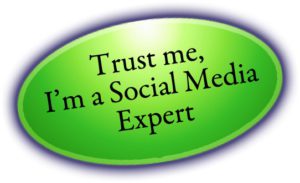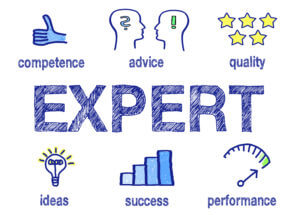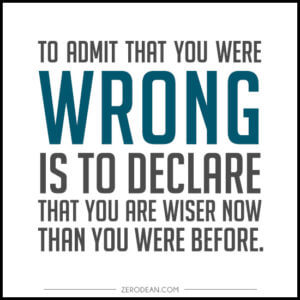“Social expert” gets hired. “Social expert” has no idea what he/she’s doing. How on earth are you going to proclaim yourself to be something you can’t even execute for yourself? – Nicolas Cole, Forbes.com
We know people use LinkedIn to search for and discover new Social Media experts. I just now did a people search in LinkedIn for “social media experts” and got back 7,961 results.
 But we know looks aren’t always what they seem. Anyone can call themselves an “expert” about anything; and It’s not hard to game LinkedIn if you want to show up for that term in its search results. Aside from the usual keyword stuffing throughout your profile, you can just get your network of colleagues to list Social Media and Social Media Marketing under your “Top Skills,” without any serious regard as to who’s equipped to judge. Of course, that makes it problematic for those trying to find out who’s really a Social Media expert. Instead, results listings on LinkedIn are inundated with people pretending to be an experts – whom I refer to as “notsperts.”
But we know looks aren’t always what they seem. Anyone can call themselves an “expert” about anything; and It’s not hard to game LinkedIn if you want to show up for that term in its search results. Aside from the usual keyword stuffing throughout your profile, you can just get your network of colleagues to list Social Media and Social Media Marketing under your “Top Skills,” without any serious regard as to who’s equipped to judge. Of course, that makes it problematic for those trying to find out who’s really a Social Media expert. Instead, results listings on LinkedIn are inundated with people pretending to be an experts – whom I refer to as “notsperts.”
Notspert – someone pretending to be an expert. #Grantasm
Why calling oneself a “Social Media Expert” is problematic.
- It’s a subjective term to begin with. “Expert” can mean different things to different people. But also, “Social media” is too all-encompassing and moving too fast to have expertise in everything that is Social Media, or even, many things.One could be an expert in one major platform and in one particular field, but have absolutely no experience in another major platform. What is the right amount? The right platforms? The right skillsets and experience?
- Some industries are well behind other industries in their understanding of effective Social Media for business purposes. I was a Social Media Director for a full year with clients in the franchising industry, and their understanding of Social Media was shockingly outdated to me; but because of that, I could see how some salesperson that I would consider to be a gross amateur in Social Media would be considered by those same misinformed people as an “expert.”
- Being an expert is continual work. “When you call yourself an expert, people are going to expect certain things from you.” – Stephanie Zionts, Account Manager with GroupHigh – a SaaS platform for tracking influencers and building relationships with them. What may have made you considered an expert a few years ago could be amateurish today without continuing to educate yourself.
 Unfortunately, the title of “Social Media Expert” on LinkedIn requires neither training, nor passing of any standard exam, nor even any attempt to update one’s education (or even have one to begin with). I shudder thinking about when I had to work under a CEO-Salesperson who “Social Media Expert” down in his title without ever actually educating himself, and refusing to do so. Why? Because he saw it as his job to sell clients on Social Media, not to actually understand it.
Unfortunately, the title of “Social Media Expert” on LinkedIn requires neither training, nor passing of any standard exam, nor even any attempt to update one’s education (or even have one to begin with). I shudder thinking about when I had to work under a CEO-Salesperson who “Social Media Expert” down in his title without ever actually educating himself, and refusing to do so. Why? Because he saw it as his job to sell clients on Social Media, not to actually understand it.
So what criteria should there be for calling oneself a Social Media expert?
 “I believe social media experts do exist; however, there are probably less than there claim to be.” says Meghan Hardy, Director of Community Management for Ignite Social Media (who just happens to put down “Social Media Expert” on her own LinkedIn profile.
“I believe social media experts do exist; however, there are probably less than there claim to be.” says Meghan Hardy, Director of Community Management for Ignite Social Media (who just happens to put down “Social Media Expert” on her own LinkedIn profile. 
 “I actually don’t pay attention to people who call themselves ‘experts’” says Phil Mershon, Director of Events for Social Media Examiner. “However, I know some use that moniker for marketing purposes. So many people do search for ‘expert’ that it makes sense to use it [in a title]. But it creates the awkward situation where people need [real] experts. I personally look for people who show they are experts through deep knowledge and a servant heart toward helping others.”
“I actually don’t pay attention to people who call themselves ‘experts’” says Phil Mershon, Director of Events for Social Media Examiner. “However, I know some use that moniker for marketing purposes. So many people do search for ‘expert’ that it makes sense to use it [in a title]. But it creates the awkward situation where people need [real] experts. I personally look for people who show they are experts through deep knowledge and a servant heart toward helping others.”
I talked with a few of my other social media specialist peers, and we all agreed that the foundation of expertise is business acumen – being able to understand the client, their industry and objectives, be able to set up a strategy and roadmap, and be able to master the evaluation tools with pre-agreed upon metrics for measuring performance. Once you have the foundation, they should possess these other qualifications.

- Engaged – they’re consistently active on social media channels.
- Educated – they regularly follow Social media news and industry trends, and get training when needed.
- Results – they deliver on performance promises and have a proven track record.
- Analytical – they can discern key performance indicators (KPIs) for different types of Social Media campaigns. For example, an awareness campaign would deal more with vanity metrics, an engagement campaign would deal with social proof (likes, shares, comments, etc.), and a conversion campaign would tie into demand generation or lead generation.
- Integrity – they can admit what they don’t know and will do what it takes to find out.
 “Being the authority on your topic does not mean that it is all about you or that you know everything.” Says Melanie Dodaro, LinkedIn expert and author of the international #1 bestseller, The LinkedIn Code. “Don’t be afraid to say “I don’t know the answer to that but I will look in to that for you.””
“Being the authority on your topic does not mean that it is all about you or that you know everything.” Says Melanie Dodaro, LinkedIn expert and author of the international #1 bestseller, The LinkedIn Code. “Don’t be afraid to say “I don’t know the answer to that but I will look in to that for you.””
Here’s my own checklist I use for how to use LinkedIn when looking for a particular Social Media expert.
- Check for certifications – check to see if they have any certificates of completion from skill testing in particular social platforms; and that they have passing grades from reputable training companies; or, better yet, the Social Media platforms themselves. (For example, I have a certificate from YouTube for passing their exam on Audience Management, which I feature on my profile.)
- Review who’s endorsing them for skillsets – An endorsement from someone who’s deemed a as a skilled professional in Social Media should carry far more weight than someone with no such work experience in their own profile.
- Check for published proof – they should be able to share case studies of campaigns with clear ROI goals.
- Look for recommendations – specifically, for clients or colleagues that can not only attest to their expertise, but results.
- See if they’re regularly active on any of the Social Media channels, especially where they claim to have expertise.
If you’re not sure about calling yourself a Social Media Expert…
- If you do at least some work in Social media, then I just recommend putting down in your title what you do that is the biggest relevant value to your target market. For example, I convinced one boss to change his title from “Social Media Expert” to “Social Media Strategist” – technically accurate and very searchable, without needing to pass any value judgement.
- If you specialize in certain social media work or wear more than one work hat (such as doing PR), then I recommend listing “Social Media Specialist” in your LinkedIn title.
My 3 parting thoughts…
- LinkedIn is still a great place to look for and follow Social Media experts, but finding who the real experts are requires doing some more legwork than a keyword search.
- “Expert” has far more weight when it’s what others with influence call you by, than what you call yourself.
- YOU’RE NOT AN EXPERT IF YOU CAN’T ADMIT YOUR MISTAKES! When it comes to Social, plausible deniability is never Trust is the cornerstone of what it means to be truly social; and you will NEVER be a Social Media Expert if your own stakeholders can’t trust you; and they will NEVER trust you if you can’t admit when you’re wrong.
What are your thoughts about this article?
Do you have any strong opinions or interesting experiences about calling oneself a Social Media expert? Do you have any differences from my own POV? Please share them in the comments below and I’ll do my best to respond personally!
Want more curated content on this topic? I recommend checking these out…
- “A letter to Social Media Experts (and the people that might potentially hire them)” – by Jessica Turner, Content and Social Media Officer at University of Oxford
- “Why Using Social Media Does Not Make You a Social Media Manager” by Nicolas Cole, Inc.com

Leave a Reply
You must be logged in to post a comment.